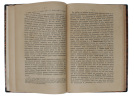1 books for « marx karl translated... »Edit
"MARX, KARL [Translated by:] P. RUMYANTSEV [Edited by:] A.MANUILOV.
Reference : 59587
(1896)
Kritika nekotorykh polozhenii politicheskoi ekonomii. (i.e.: ""Zur Kritik der Politischen Oekonomie"", i.e.: ""A Contribution to the Critique of Political Economy""). - [FIRST RUSSIAN TRANSLATION OF THE BLUEPRINT FOR ""DAS KAPITAL"" ]
Moscow, Izdanie Vladimira Bonch-Bruevicha, 1896. 8vo. In a later modest black half calf binding with marbled boards. Traces of stamp to verso of front and back board. Title-page slightly rubbed. Occassional underlignings in text and margins. Pp. 145-146 reinforced in margin. Otherwise a fine copy. XII, (4), (1)-160 pp.
Exceedingly rare first Russian translation of this groundbreaking work, in which Marx first presents his revolutionizing theories of capitalism. For years, the present work was largely overshadowed by ‘Das Kapital’, and despite being published 8 years earlier (The original being published in 1859, ‘Das Kapital’ in 1867), the present work was not translated, until ‘Das Kapital’ had made Marx a household name in socialist and revolutionary circles, making the present translation comparatively early (the first English translation being from 1904).The Russian censorship cut Marx’ preface in this first translation - the full text did not appear until the revolutionary decade of 1905-1917. This Manuilov/Rumiantsev-translation remained the canonic-translation throughout the Soviet rule. The translation was made by Bolshevik revolutionary Petr Rumiantsev (1870-1924), who left the party in 1907 and emigrated in 1918, but the success of the present translation is primarily due to editor Manuilov. Editor Alexander Appolonovich Manuilov (1861-1929) was a Russian economist and politician, famous not only as one of the founding members of the Constitutional Democratic party (known as the Kadets), but also as the Russian translator of the present work. ""Manuilov graduated from the law department of the University of Novorossiia (Odessa, 1883). He began scholarly and pedagogical work in political economy in 1888. In 1901 he became head of a subdepartment at Moscow University, becoming assistant rector in 1905 and serving as rector from 1908 to 1911. He was dismissed by the tsarist government for attacking the ""extremes"" of Stolypin's agrarian legislation. In the 1890's he was a liberal Narodnik (Populist), later becoming a Constitutional Democrat (Cadet) and a member of the Central Committee of the Cadet Party. Manuilov's draft on agrarian reform (1905) was the basis for the Cadets' agrarian program. V. I. Lenin sharply criticized Manuilov, calling him one of ""the bourgeois liberal friends of the muzhik who desire the 'extension of peasant land ownership' but do not wish to offend the landlords"" (Poln. sobr. soch., 5th ed., vol. 11, p. 126, note).""At the beginning of his scholarly career Manuilov accepted the labor theory of value. In 1896 he translated K. Marx' work A Contribution to the Criticism of Political Economy (Zur Kritik der Politischen Oekonomie). During the years of reaction he espoused subjectivist and psychological views in political economy. In 1917 he was minister of education of the Provisional Government. After the October Revolution in 1917 he emigrated but soon returned and cooperated with Soviet power. He participated in the orthographic reform (1918). In 1924 he became a member of the board of Gosbank (State Bank). He taught in higher educational institutions. Changing to Marxist positions and relying on Lenin's works, he criticized the revisionists and neo-Narodniks on the agrarian question."" (Encycl. Britt.). For many years, the exclusive focus on ""Das Kapital"" meant that the ""Kritik"" was overlooked. Since the beginning of the 1960's, however, scholars have become increasingly aware of its importance as the blueprint for the social and economic theory Marx shall go on to develop (see for example Raymond Aron, ""Le Marxisme de Marx"", 1962). It is here that Marx outlines the research programme to which he shall devote the rest of his working life. He himself described ""Das Kapital"" as a continuation of his ""Zur Kritik der politischen Oekonomie"" (see e.g. PMM 359), in which his primary concern is an examination of capital and in which he provides the theoretical foundation for his political conclusions later presented in ""Das Kapital"". ""I examine the system of bourgeois economy in the following order: capital, landed property, wage-labour" the State, foreign trade, world market. The economic conditions of existence of the three great classes into which modern bourgeois society is divided are analysed under the first three headings the interconnection of the other three headings is self-evident. The first part of the first book, dealing with Capital, comprises the following chapters: 1. The commodity, 2. Money or simple circulation" 3. Capital in general. The present part consists of the first two chapters."" (Preface to the present work, in the translation (by S.W. Ryazanskaya) of the Progress Publishers-edition, Moscow, 1977). Apart from the obvious importance of the work as the foundational precursor to what is probably the greatest revolutionary work of the nineteenth century, the ""Kritik"" is of the utmost importance in the history of political and economic thought, as it is here, in the preface, that Marx outlines his classic formulation of historical materialism. This preface contains the first connected account of what constitutes one of Marx's most important and influential theories, namely the economic interpretation of history - the idea that economic factors condition the politics and ideologies that are possible in a society. ""The first work which I undertook to dispel the doubts assailing me was a critical re-examination of the Hegelian philosophy of law"" the introduction to this work being published in the Deutsch-Franzosische Jahrbucher issued in Paris in 1844. My inquiry led me to the conclusion that neither legal relations nor political forms could be comprehended whether by themselves or on the basis of a so-called general development of the human mind, but that on the contrary they originate in the material conditions of life, the totality of which Hegel, following the example of English and French thinkers of the eighteenth century, embraces within the term ""civil society"""" that the anatomy of this civil society, however, has to be sought in political economy. The study of this, which I began in Paris, I continued in Brussels, where I moved owing to an expulsion order issued by M. Guizot. The general conclusion at which I arrived and which, once reached, became the guiding principle of my studies can be summarised as follows. In the social production of their existence, men inevitably enter into definite relations, which are independent of their will, namely relations of production appropriate to a given stage in the development of their material forces of production. The totality of these relations of production constitutes the economic structure of society, the real foundation, on which arises a legal and political superstructure and to which correspond definite forms of social consciousness. The mode of production of material life conditions the general process of social, political and intellectual life. It is not the consciousness of men that determines their existence, but their social existence that determines their consciousness. At a certain stage of development, the material productive forces of society come into conflict with the existing relations of production or - this merely expresses the same thing in legal terms - with the property relations within the framework of which they have operated hitherto. From forms of development of the productive forces these relations turn into their fetters. Then begins an era of social revolution. The changes in the economic foundation lead sooner or later to the transformation of the whole immense superstructure."" (Preface to the present work, in the translation (by S.W. Ryazanskaya) of the Progress Publishers-edition, Moscow, 1977). OCLC lists merely three copies, all in the US (Havard, Wisconsin, and Hoover Institute on War).
 Write to the booksellers
Write to the booksellers




